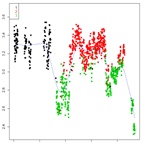
| [ Information ] [ Publications ] [Signal processing codes] [ Signal & Image Links ] | |
| [ Main blog: A fortunate hive ] [ Blog: Information CLAde ] [ Personal links ] | |
| [ SIVA Conferences ] [ Other conference links ] [ Journal rankings ] | |
| [ Tutorial on 2D wavelets ] [ WITS: Where is the starlet? ] | |
If you cannot find anything more, look for something else (Bridget Fountain) |
|
|
|
|
